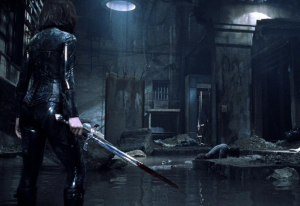In many ways, Mortal Kombat as a whole is defined by its Fatalities. The finishing moves that have been video game franchise since its inception is a large part of where Mortal Kombat’s identity comes from. As such, when it was announced that a new Mortal Kombat film reboot would be coming about, many longtime fans stressed that Fatalities had to appear in some capacity. Fortunately, those over at Warner Bros. Pictures agreed and made the film rated R to account for their inclusion. But what is it about Fatalities that are so integral to Mortal Kombat? Well, there are a number of reasons.
Videos by ComicBook.com
When Mortal Kombat first debuted back in 1992, the game’s violence was what made it stand out above everything else. In a time where the fighting game genre was beginning to rapidly grow, the scene was mostly defined in the early ’90s by Capcom’s mega-popular Street Fighter II. When Midway decided to enter the fray with its Mortal Kombat series, it needed to stand out amongst the competition and ensure that it could pull players away from other titles within the genre. One of the best ways in which the team at Midway ended up deciding that it could bring in new fans is if it created a mature, ultra-violent fighting game which greatly juxtaposed the other most popular games at the time.
With violence being such an important pillar of Mortal Kombat, the finishing moves, which became known as “Fatalities,” are where the game really was really able to highlight this gore. Whether it be punching someone’s head off, ripping out their heart, or uppercutting them into a pit of spikes, Midway included a number of brutal moves in the original Mortal Kombat that would allow you to beat down your opponent in style. Before long, this focus on violence is what caused Mortal Kombat to get a reputation, especially outside of gaming circles.
A year after Mortal Kombat’s release in 1993, the United States government held a committee hearing to discuss its concerns with the game’s violent content. In response, the ESRB was then established the following year in 1994 to help more adequately inform purchasers of the material found in a given video game. Mortal Kombat is one of the most notable games of the time to have caused this chain of events.
To this day, Mortal Kombat is still very much defined by its violence. Whenever a new installment in the series releases, the first thing that many fans want to know about is what new Fatalities developer NetherRealm Studio has injected into the franchise this time around. Although the story, lore, and characters of Mortal Kombat are adored as well, it’s this focus on blood, guts, and gore that still causes the games to make waves today.
So with all of this in mind, it’s quite vital that any accompanying Mortal Kombat media be one that features Fatalities. For anything related to Mortal Kombat to not contain hyper-violence practically steals the franchise of its identity.
As mentioned, the upcoming Mortal Kombat reboot film will indeed contain quite a bit of violence and Fatalities, however, making it a faithful adaptation on paper. Whether or not the rest of the movie stacks up remains to be seen later this week when it releases both in theaters and on HBO Max on April 23rd.








